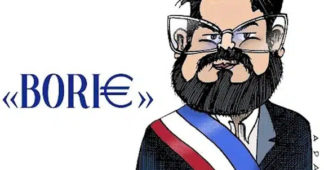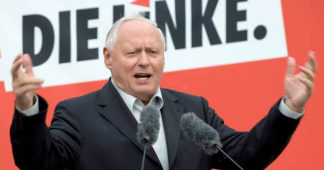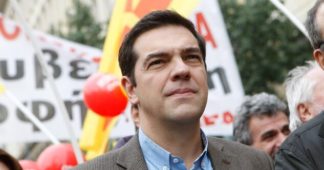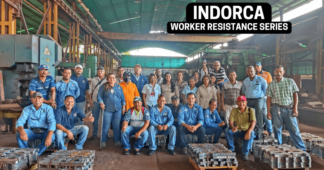by Spyros Kouridakis
a Greek citizen who experiences
political discontent and has no party allegiance
I had been waiting for the unpleasant news of the previous week since the spring of 2024. And yet, despite my psychological preparation, the idea that the death of José Mujica, president of Uruguay until 2015, is expected from day to day, shook me.
According to his own statement, José Mujica’s imminent biological end is due to the metastasis of oesophageal cancer to the liver, which has led him to refuse any further medical help. In making this decision, he took into account his advanced age (89) and his longstanding health problems (systemic vasculitis, kidney failure). So instead of desperately seeking medical solutions, he is now taking care of his funeral. His one last wish: to be buried on his farm, next to his beloved disabled dog, under the shade of a sequoia that he planted himself.
I never had the honor of meeting José Mujica, but for me he is a completely familiar public figure, a personality who has fundamentally marked my thinking, my politics, my social and personal behaviour. Although he is still alive, I feel a strong need to go back to my archives, to write a kind of obituary from now on and share it with other friends and comrades. I see it as a personal debt to be repaid. I do not care if it is perceived as praise or as a hagiography of this particular man. That is the last thing that would concern me.
José Mujica, El Pepe of the Tupamaros guerrillas, “the poor man of the Uruguayan people”, often called the poorest president in the world, a humble fighter for social justice, is ending his journey on Earth. He will continue it in the memory of millions of people. He, the emblematic inspirer of a unique leading example of populαrity and democratic consciousness in the entire history of the global unconventional radical Left (probably a unique example for its distant future as well) announced to us a few days ago that he is dying. Through simple words, as is usually the case with the words of the brave: “I am dying. My circle is closed.”
Officially known as José Alberto Mujica Cordano, he was elected President of the Republic of Uruguay for the period 2010 to 2015. He had previously been appointed Minister of Agriculture. Before that, he had been elected a deputy and then a senator.
Until then, he was a simple farmer who planted and sold chrysanthemums. However, being at the same time a fighter in the service of his people, he founded, together with his old former Tupamaro comrades, the radical left-wing political “Movement for Popular Participation”, which a little later joined a coalition of left-wing forces, the so-called “Broad Front” (Frente Amplio) These were the only channels for José Mujica’s political advancement within the bourgeois political system of power in Uruguay. Mujica had no relationship with the bourgeoisie and its political personnel, no relationship with the Catholic Church and the landowners, no relationship with the economically powerful in his country.
José became a leader by walking and working in the fields and on streets. He had no academic qualifications to show for it, he had no urban education, he was not the classic Western intellectual and politician. His wisdom and his education were the products of a relentless effort at self-education, of his compassion for the marginalized, of the strong political instinct for social justice that he possessed, but also of his painful personal experiences from the era of illegality, torture and prison.
Because this simple farmer and popular fighter had just experienced, for over a decade, the fate of a political prisoner in the hells of his country’s (parliamentary, then military) dictatorship. He was someone who managed to survive (due to pure luck and the altruism of a doctor), with 6 bullets he had received in his body, during an ambush by the secret police. In his guerrilla history he had an additional 4 arrests and 2 personal escapes. He suffered from periods of terrible torture. He spent 2 years in complete isolation, at the bottom of a dried-up well. He also participated in a great escape with 103 other comrades. He was arrested again, suffered new (latest technology, made in USA) torture. He went through a lot, he didn’t give up his fight, he never betrayed.
El Pepe fought for social emancipation as an urban guerrilla, being a member of the leftist Tupamaros Organization inspired by the Cuban revolution. He joined it at the age of 30 and acquired a significant role in 1969, when the Organization’s operational activity began.
As the son of a poor rural family, and a single-parent one after the premature death of his Basque father, in 1940, when he was 5 years old, little José grew up in deprivation, working in the fields, together with his Italian-born mother and his Italian grandparents. In his adolescence he achieved the first level of social maturity, the complete rejection of social inequality. In his early adulthood he achieved a new level of awareness, that of political maturity. In the conditions of an unprecedented economic and social crisis for his country, this political maturation would lead him to the paths of armed struggle against capitalism.
The armed struggle, the illegality, the prison, the first completely peaceful years of the Uruguayan post-coup period and his direct contact with the seductive sirens (the sweet poisons) of power led José Mujica to a deep reflection on a wide range of issues and ultimately to radical social, political and personal choices. The latter were decisive in his new spiritual formation towards a new type of popular leader, alongside his tireless effort to build a new type of alternative political hegemony, through the power of personal example.
I will try to describe some of his endless identity elements, as far as I can, in four, distinct but interconnected levels of thought and action
First, in the sphere of his publicly declared personal values
In a completely Catholic country and in a society dominated by petty-bourgeois ideologies, conservative family and religious traditions, José Mujica proved to be a profoundly nonconformist, a sworn opponent of all kinds of puritanism and conservatism, of all forms of irrational or pointless consumerism and enrichment, of all chauvinist and war ideology. He was the leader of a small country who raised his stature against all kinds of those responsible for the environmental destruction of the planet, a popular leader of the people who remained until the end a clearly declared atheist in the middle of a sea of loyal Catholic supporters. He was the one who managed to condense, in deed and word, the quintessence of the democratic consciousness of the society that raised him. In his final farewell to every Uruguayan compatriot, he formulated as a final piece of advice and a legacy of values one of the central universal pillars of democracy: «It is easy to respect those who think like you, but you must learn that the foundation of democracy is respect for those who think differently from you»
Secondly, in the sphere of his government decisions as president of the country, José Mujica achieved among many other things
– a bold fiscal redistribution of wealth
– A 250% increase in the minimum wage, the minimum daily wage and the minimum pension.
-Strengthened family farming and ranching against competition from large private agricultural corporations
-Reducing the poverty rate from 40% to 11%
-Reducing unemployment from 13% to 7%
– Decriminalizing the use of cannabis and its legal sale in state pharmacies. (Jose’s argument: “Drug trafficking is worse than drugs. It is much worse. Drugs are a disease. And I don’t think there are good drugs or that marijuana is good – not even cigarettes”).
-Legalization of abortion up to the 4th month of pregnancy (despite hysterical voices and strong reactions from the conservative opposition and the Church)
– Legalization of same-sex couples marriage (ignoring accusations of sinful law and support for the woke culture)
Third, in the realm of public personal example and personal life
– One of José Mujica’s first acts was to announce that he would only receive 10% of the monthly presidential allowance, an amount of around 800 euros, equivalent to the average monthly salary of a worker in his country. The same was done by his beloved life partner, Lucia Topolanski, a great fighter with whom he was associated during the years of the armed struggle. Topolanski, a congresswoman from 2000 to 2005, a member of the Senate from 2005 to 2017 (and from 2020 to 2022) and vice president of Uruguay from 2017 to 2020, the scion of a prominent bourgeois family (who spat on her social class from her student days and joined the Tupamaros), acted like José Mujica. They both gave 90% of the money from their public positions to a Fund to support socially vulnerable families and small start-ups. Both refused to enrich themselves through the Public Fund.
– During his travels from his farmhouse to the Presidential Office and in all his general movements around the country, Mujica refused to use the presidential limousine. He went everywhere in a shabby 1980s Volkswagen Beetle, driving himself. When his car was in the garage, he did not hesitate to use public transportation, which put the members of the secret police responsible for his security in a difficult position. Despite Mujica’s strong objections to the existence of bodyguards, the only thing that was achieved was to limit the number of police officers in his security (from the approximately forty provided for by the regulations) to eight.
– Due to Mujica’s frequent trips to other Latin American countries, his associates insisted that the country purchase a presidential jet for these occasions. When Mujica learned the purchase price, he was horrified. He counter-proposed that the jet money be used to purchase an expensive rescue helicopter that would provide emergency medical services and have a full operating room. His proposal was implemented, and the helicopter became a permanent symbol of the famous economic rationality of the president’s popular policies.
– It was well known that José Mujica suffered from serious chronic illnesses. And there were many times when his personal doctor recommended that he be treated urgently in a hospital. The unique and admirable thing about his case was the fact that he never accepted to violate the waiting list of other patients, to have preferential treatment. No matter how urgent his problem was considered, he waited patiently and stubbornly, sometimes in a chair, sometimes on a stretcher, for his turn to come. He saw not having preferential treatment as a matter of personal dignity
– Residents of the capital, supporters or political opponents, often saw the President of the Republic, José Mujica, walking through the streets holding a pack of leaflets and brochures in his arms that he distributed to passers-by. All of this referred to his legislative initiatives or his thoughts on other future ones that he intended to carry out. His dialogues with the public, mainly with his political opponents, were not uncommon. Some of his brochures remained historic, mainly for the intense discussions that they provoked between him and many citizens. Such were those that condemned violence against women and those that explained the inalienable right of women to abortion. The streets and squares were transformed into a parliament, citizens spoke fearlessly, José was just one of them. He answered, he asked, he retorted. A completely different leader of the Uruguayan left from all the previous ones, he put the stamp of his personal democratic example on the people’s consciences. It was no small feat.
– The appearance (clothing, not physique) of congressman, senator and president José Mujica was a source of constant discussion. This man never went out in a suit and tie, which were unfamiliar to him. In most cases, he didn’t even wear the shoes that most people wear. Usually, regardless of the place he was in, he appeared in plastic sandals or even rubber boots. I was stunned when I saw a photo of him at an international forum, on the topic – if I remember correctly – of ending the armed civil conflict in Colombia (it must have been in Bogotá). José was walking completely at ease in a corridor of the International Conference Center, wearing… yellow rubber boots! As for his clothes, at some point they stopped provoking discussion. They were clean, but they had been used for many years, old-fashioned and worn out. If a respectable celebrity dressmaker saw them, he wouldn’t be able to bear the shock. He would probably slit his wrists.
Fourth, in the sphere of a personal philosophy of José Mujica. His statements on poverty, self-sufficiency, frugal living, but also on the assessment of his role as a leader
- a) On poverty and self-sufficiency
These are the most misunderstood aspects of José Mujica’s personality and thought.
The people of his country, friends and opponents alike, had given him the designation of “the poorest president in the world.” Mujica categorically denied this (honorary) designation. As he himself stated shortly after his election: « I am not the poor president, as they call me. Poor are people who need a lot. I am simply a frugal president. I like to live like the majority of my country. It is the same majority that elected me. And that is why I identify with it. Morally, I have no right to live like the minority in my country.»
To add later: « I stand out because of my (moral) values and my way of life that reflect the values of those in society to whom I am honored to belong. And I cling to them. Being president doesn’t matter.»
But it was not just a question of moral attitude towards his compatriots. Behind the moral issue there was a deeper core of experiences that constituted a structured philosophy of personal austerity. His following statement is more than typical:
«Poor is he who needs a lot to live. My way of life is the result of my wounds. I am the son of my history. There were years when I was happy, when I only had a mattress to sleep on…»
The experiences were one side. But they were not the only one. In Mujica’s mind, two ancient philosophical traditions coexisted simultaneously, one from Latin literature and one from the communal wisdom of the indigenous Aymara people of Latin America. Mujica often invoked the definition of the poor, formulated by Seneca: «Poor is not he who has very little, but he who longs to have more ». They also invoked the indigenous Aymara approach: «Poor is he who has no community: he who is alone.»
It is obvious that these views were misunderstood, even by the friendly camp. They were treated as a supporter of a state policy of austerity as recorded in the Western World. Paradoxical views, of course, when they are said as a reproach to him, whose first and constant concern was to improve the living standards of the poor of his homeland. In order to address these misunderstandings, José Mujica was forced to proceed with many additional clarifications. Instead of the term austerity, he introduced his own term, “sobriety”. He probably meant by this a careful, rational behavior of the “citizen-consumer” or even the “state-buyer” towards the consumer challenges of the markets, in the sense of continence or self-control. His relevant statements are clear:
«I am not a supporter of poverty. I am a supporter of sobriety.»
«Since we invented the consumer society, consumption has to increase and if we don’t manage to do that, it’s a tragedy. We’ve created a lot of unnecessary needs. We buy new things, we throw away old things… It’s a waste of our lives.»
In another intervention, Mujica clarified:
« I’m not saying we should go back to the caves. What I’m recommending is that we stop wasting resources on useless things… We can live by spending on things that are truly important to all of us.»
And one more thing, associating consumption with personal freedom:
«When we buy something, we don’t pay (only) with money. We pay with hours of our lives that we had to spend to earn that money. The difference is that there’s one thing we can’t buy: time. Life is getting shorter. And it’s a shame to waste time and our freedom like that.»
To add at a different time: « It’s a question of freedom: If you don’t have many material goods, then you don’t have to work your whole life like a slave to maintain them and therefore you have more time for yourself.»
- b) On the evaluation of José Mujica’s governmental work by himself
Jose Mujica did not profess Uruguayan socialism or any other of the 21st century. Perhaps because some of his Latin American colleagues had refused to reveal to him the magic formula of socialist construction. Mujica as president did not present himself as the candidate to overthrow the bourgeois system of his country. On the contrary, he fought as much as he could against bourgeois values, whether those directly emitted by the bourgeoisie or those that were diffused as petty-bourgeois ideologies among the masses of the working people.
He gave the people bread, adequate healthcare, absolutely free access to education and culture and, along with all this, full democratic rights and dignity.
-He was and declared himself a left-wing politician, always careful to avoid what he believed to be the great trap of every left.
Because according to Mujica: «The pathology of the left is infantilism. It is the permanent confusion between an illusion and reality.»
-Having rejected infantilism, he declared to the people with absolute honesty and impressive modesty:
«My aim is to reduce a little the injustice in Uruguay, to help the most vulnerable and to leave behind a way of political thinking, a way of seeing the future that will be transmitted and used to progress. There is nothing short-term, there is no triumph around the next corner. I do not want to reach heaven, nothing like that. What I want is to fight for the progress of the common good.»
-As a model of humility of thought of a left-wing leader, he explained:
«The first part of my life I worked as a farmer in the fields. The second, I dedicated to myself, to the struggle for change, to improving the conditions in my society. Today I am president and tomorrow I will die like everyone else and disappear.»
-And as the most honest, sincere and brave political leader on the global left he confessed:
« I dedicated myself to changing the world and I changed… nothing !!!!»
« But I had a good time. And I made many friends and many allies in this madness – to change the world – to improve it. And thus I gave a meaning to my life.»
This was (in very short) the life, this was the state, this was the thought and the living consciousness of a fiery revolutionary who always believed that social change is not imposed but only conquered, by the popular masses themselves.
Now that I am thinking about the coming end of my beloved José, I hope it will not be a long and very painful death.
We remind our readers that publication of articles on our site does not mean that we agree with what is written. Our policy is to publish anything which we consider of interest, so as to assist our readers in forming their opinions. Sometimes we even publish articles with which we totally disagree, since we believe it is important for our readers to be informed on as wide a spectrum of views as possible.











